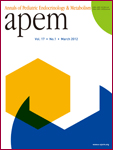
AMERICAN JOURNAL OF PHYSIOLOGY-ENDOCRINOLOGY AND METABOLISM
Scope & Guideline
Exploring the frontiers of hormonal regulation.
Introduction
Aims and Scopes
- Endocrine Regulation and Metabolism:
Research in this area examines how hormones such as insulin, glucagon, and others regulate metabolic pathways, influencing energy balance, glucose homeostasis, and lipid metabolism. - Obesity and Metabolic Disorders:
The journal features studies that investigate the biological and molecular mechanisms underlying obesity, diabetes, and related metabolic disorders, as well as potential therapeutic interventions. - Exercise Physiology and Metabolism:
Papers exploring the impact of physical activity on metabolic health, including the effects of exercise on insulin sensitivity, muscle metabolism, and overall endocrine function. - Nutritional Physiology:
Research that delves into the role of diet and nutrition in metabolic health, including the effects of specific dietary components on hormonal regulation and metabolic pathways. - Developmental and Environmental Influences:
Studies that focus on how genetic, maternal, and environmental factors affect metabolic health and endocrine function across the lifespan. - Cellular and Molecular Mechanisms:
Investigations into the cellular and molecular mechanisms regulating hormone action, signaling pathways, and their implications for health and disease.
Trending and Emerging
- Intermittent Fasting and Metabolic Flexibility:
Research exploring the effects of intermittent fasting on metabolic health, gut microbiota, and insulin sensitivity is gaining popularity as more studies demonstrate its benefits for obesity management and metabolic flexibility. - Microbiome and Metabolism:
The exploration of the gut microbiome's role in metabolic health and its interaction with dietary components and hormones is a rapidly growing area of interest, highlighting the importance of microbiota in regulating energy balance. - Personalized Nutrition and Metabolic Health:
Emerging studies focus on how personalized dietary strategies can optimize metabolic health, particularly in individuals with obesity and metabolic disorders, emphasizing the role of genetics and individual responses to nutrition. - Hormonal Interactions in Metabolism:
There is an increased emphasis on understanding the interactions between multiple hormones in regulating metabolism, with research investigating the synergistic effects of hormones like FGF21, GLP-1, and insulin. - Exercise as a Therapeutic Modality:
The therapeutic effects of exercise on metabolic health are being extensively studied, with a focus on understanding the underlying mechanisms and optimizing exercise protocols for individuals with metabolic diseases.
Declining or Waning
- Traditional Pharmacological Interventions:
Research focused on conventional pharmacological treatments for metabolic diseases appears to be waning, as newer approaches, such as lifestyle interventions and integrative therapies, gain traction. - Basic Animal Models:
While animal studies remain important, there is a noticeable decrease in the number of traditional rodent model studies, possibly due to a shift towards more translational research that includes human subjects. - Single Hormone Studies:
There seems to be a decline in studies focusing solely on the effects of single hormones, as there is a growing interest in understanding the complex interactions between multiple hormones and metabolic pathways. - Chronic Disease Mechanisms:
Research exploring the mechanisms of chronic diseases like diabetes and obesity in isolation is decreasing, with a trend towards integrative approaches that consider multiple factors influencing health.
Similar Journals

ACTA DIABETOLOGICA
Unveiling Insights into Metabolic DisordersACTA DIABETOLOGICA, published by SPRINGER-VERLAG ITALIA SRL, is a distinguished peer-reviewed journal dedicated to the rapidly evolving fields of endocrinology, diabetes, and metabolism. With an impressive convergence of research from 1991 to 2024, it is recognized for its significant contributions, boasting a Q1 ranking in Internal Medicine and Q2 rankings in Endocrinology categories as of 2023. Its Scopus rankings further highlight its impact, placing it in the 81st percentile in Internal Medicine. The journal serves as a vital platform for professionals and researchers, facilitating the dissemination of innovative findings and fostering a comprehensive understanding of metabolic disorders. Although the journal is not open access, it remains an essential resource, ensuring high visibility and accessibility of critical research to its scholarly audience.

JOURNAL OF PEDIATRIC ENDOCRINOLOGY & METABOLISM
Innovating Care for Pediatric Endocrine DisordersThe JOURNAL OF PEDIATRIC ENDOCRINOLOGY & METABOLISM, published by Walter de Gruyter GmbH, is a reputable peer-reviewed journal dedicated to advancing the field of pediatric endocrinology and metabolism. Since its inception in 1985, this journal has become a vital resource for professionals and researchers, providing insights into the latest advancements, clinical practices, and foundational research in the care of children with endocrine disorders. With a noted Q3 ranking in Endocrinology, Diabetes and Metabolism, and a robust focus on Pediatrics, Perinatology, and Child Health, it addresses important topics such as hormonal imbalances and metabolic syndromes in young populations. Despite its non-open access status, it continues to play an essential role in bridging the knowledge gap within our understanding of children's health and disease, contributing significantly to the progress in this specialized field.

HORMONE AND METABOLIC RESEARCH
Exploring the Interplay of Hormones and MetabolismHORMONE AND METABOLIC RESEARCH, published by GEORG THIEME VERLAG KG, stands as a reputable platform in the fields of biochemistry, endocrinology, and metabolism since its establishment in 1969. This peer-reviewed journal provides critical insights and advancements in the intricate relationships between hormones and metabolic processes, catering to researchers, healthcare professionals, and students alike. With an impressive convergence of knowledge spanning over five decades, it maintains a commendable Q3 ranking in multiple categories, including Biochemistry, Clinical Biochemistry, and Endocrinology, highlighting its contribution to cutting-edge scientific discourse. Although not an open-access journal, it offers a plethora of access options for readers and institutions, ensuring that vital research reaches those who need it most. Located in Stuttgart, Germany, the journal is positioned at the forefront of influential research in hormone and metabolic studies, emphasizing its importance for ongoing investigations into health and disease.

Cell Metabolism
Illuminating the pathways of health and disease.Cell Metabolism is an esteemed journal published by CELL PRESS, dedicated to advancing the understanding of metabolic processes within cell biology, molecular biology, and physiology. With an impactful 2023 ranking placing it at Q1 in multiple categories and earning a distinguished position in the top percentiles of its respective fields, this journal serves as an essential resource for researchers, professionals, and students who are investigating the dynamic roles of metabolism in health and disease. Its rigorous peer-review process ensures high-quality publications that reflect the latest advancements in metabolic research. Since its inception in 2005, Cell Metabolism has become a pivotal platform for disseminating critical findings that not only expand scientific knowledge but also foster innovative approaches to tackle metabolic disorders. By prioritizing accessibility and scholarly excellence without the Open Access model, it remains a premier source for cutting-edge research insights.

DIABETES-METABOLISM RESEARCH AND REVIEWS
Advancing the Science of Diabetes and MetabolismDIABETES-METABOLISM RESEARCH AND REVIEWS, published by WILEY, is an esteemed academic journal focusing on the forefront of research in the fields of endocrinology, diabetes, and metabolism. Since its inception in 1999, this journal has become a crucial resource for researchers, professionals, and students, boasting an impressive impact factor that reflects its high citation rates and contribution to the field. With a 2023 classification of Q1 in several categories including Endocrinology and Internal Medicine, it ranks among the top journals globally, demonstrating its significant influence and authority. The journal serves as a platform for the dissemination of innovative research, reviews, and methodologies that advance understanding and treatment of metabolic disorders. By offering valuable insights and fostering collaboration within the scientific community, DIABETES-METABOLISM RESEARCH AND REVIEWS is essential reading for anyone involved in diabetes research and clinical practice.

EXPERIMENTAL PHYSIOLOGY
Integrating experimental insights for healthier futures.EXPERIMENTAL PHYSIOLOGY, published by WILEY, stands as a vital resource in the fields of Nutrition and Dietetics and Physiology, providing high-quality, peer-reviewed research since its inception in 1990. With an impressive categorization into the Q2 quartile in these domains, the journal emphasizes the integration of experimental and clinical findings, making significant contributions to our understanding of physiological processes and nutritional impacts on health. The journal operates within a competitive landscape, ranked significantly in Scopus, showcasing its relevance to both the medical community and nutritional sciences, as evidenced by its rankings in Nursing, Medicine, and Biochemistry. Though it is not currently open access, the journal remains an indispensable tool for researchers, professionals, and students seeking to deepen their knowledge and stay updated on cutting-edge research. With a publication window extending to 2024, EXPERIMENTAL PHYSIOLOGY continues to influence the academic discourse and promote advancements in its respective fields.

JOURNAL OF PHYSIOLOGY AND BIOCHEMISTRY
Fostering Collaborative Discoveries in Biomedical ResearchJOURNAL OF PHYSIOLOGY AND BIOCHEMISTRY, published by Springer in the Netherlands, serves as a pivotal platform for disseminating high-quality research within the fields of physiology, biochemistry, and related biomedical sciences. With an impressive impact factor reflected in its categorization as Q2 in Biochemistry and Q1 in Medicine (miscellaneous), this journal fosters a vibrant community of scholars dedicated to advancing knowledge and innovation. The journal’s broad scope encompasses a wide range of topics from cellular mechanisms to systemic physiology, making it relevant for both theoretical and applied sciences. Researchers and practitioners are encouraged to utilize the available Open Access options to reach a wider audience. The journal’s continuous contribution to the scientific dialogue since its inception in 1996 positions it as a key resource for professionals and students alike, facilitating the exploration of cutting-edge topics and collaborative research opportunities.

DIABETOLOGIA
Shaping the future of diabetes care with impactful research.DIABETOLOGIA is a leading journal in the field of endocrinology and diabetes research, published by Springer since its inception in 1965. With an impactful presence in both Internal Medicine and Endocrinology, Diabetes and Metabolism, it is recognized in the Q1 quartile rankings for 2023, underscoring its significance and contribution to these disciplines. The journal holds impressive Scopus rankings, placing it in the top 5% of journals in its categories, making it an essential resource for researchers, healthcare professionals, and students dedicated to advancing knowledge and practices in diabetes care and management. DIABETOLOGIA publishes a range of peer-reviewed articles, original research, and reviews that address the latest scientific developments, clinical practices, and therapeutic innovations, contributing to the global discourse on diabetes and its related health implications. Although it does not offer Open Access options, its rigorous selection process guarantees the quality and relevance of the content, solidifying its position as a reliable reference for contemporary research. For those looking to stay at the forefront of diabetes science, DIABETOLOGIA is a vital communique in the ever-evolving landscape of medical research.

Annals of Pediatric Endocrinology & Metabolism
Driving progress in the understanding of pediatric metabolic diseases.Annals of Pediatric Endocrinology & Metabolism, published by the Korean Society of Pediatric Endocrinology, is a vital resource for researchers, healthcare professionals, and students in the fields of endocrinology, diabetes, and pediatric health. With its commitment to open access since 2012, the journal facilitates the dissemination of groundbreaking research on pediatric endocrine disorders and metabolic diseases, ensuring that vital knowledge is accessible to a global audience. The journal maintains a reputable standing with a 2023 Scopus rank of #92 in Pediatrics and a Q3 quartile in Endocrinology, highlighting its impact on the field. Originating from South Korea, the journal fosters a collaborative network of researchers and advocates best practices in pediatric care through interdisciplinary studies. The Annals not only enhances scientific understanding but also emphasizes practical applications aimed at improving child health outcomes, making it an essential publication for academics and practitioners alike.

Journal of the Endocrine Society
Empowering the endocrine community with open access insights.Journal of the Endocrine Society, published by the ENDOCRINE SOC, stands as a prominent platform for disseminating significant research and findings within the field of endocrinology, diabetes, and metabolism. Established as an Open Access journal since 2017, it aims to increase the visibility and accessibility of vital scholarly contributions, allowing researchers and professionals from various backgrounds to engage with the latest insights in this rapidly evolving discipline. With an impressive Q2 ranking in Endocrinology, Diabetes and Metabolism, the journal is recognized for its impact, ranking #100 out of 244 in Scopus, highlighting its role in advancing scientific knowledge and fostering innovation. The journal, based in the United States at 2055 L ST NW, SUITE 600, WASHINGTON, DC 20036, continues to enrich the academic landscape by converging state-of-the-art research and clinical applications through its publication cycle from 2017 to 2024. Researchers, students, and healthcare professionals are encouraged to explore this essential resource to stay at the forefront of endocrinological advancements.